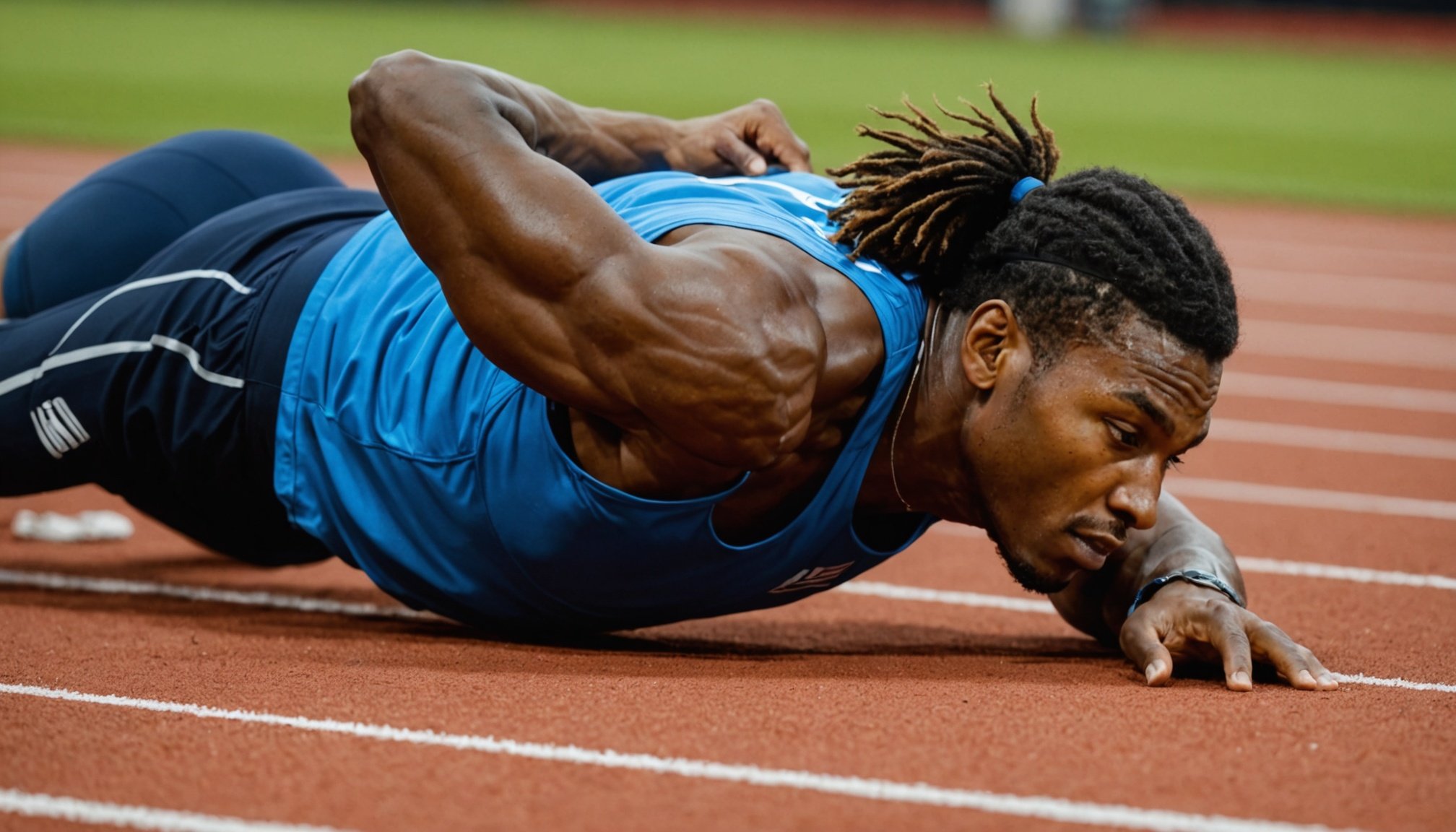Unlocking Superior Sleep Strategies for Enhancing Performance in Track and Field Athletes
When it comes to optimizing performance in track and field, athletes often focus on intense training programs, rigorous strength training, and meticulous nutrition plans. However, one of the most critical yet often overlooked components of athletic success is sleep. In this article, we will delve into the importance of sleep for athletes, explore strategies to improve sleep quality, and discuss how adequate sleep can significantly enhance athletic performance.
The Importance of Sleep for Athletes
Sleep is not just a passive state of rest; it is an active process that plays a crucial role in physical recovery, muscle repair, and mental rejuvenation. For track and field athletes, sleep is essential for several reasons:
In the same genre : Exploring the Impact of Antioxidants on Post-Workout Recovery from Intense Exercise
Physical Recovery
Sleep is vital for the repair and growth of muscles, tendons, and bones. During sleep, the body releases hormones that help in the repair of muscles and the strengthening of bones, which is particularly important for athletes who engage in high-intensity training sessions[4].
Cognitive Function
Adequate sleep improves cognitive functions such as decision making, concentration, and reaction time. These cognitive abilities are critical for athletes to perform at their peak, especially in high-pressure competitions where split-second decisions can make all the difference[4].
Additional reading : Unlocking Performance: The Advantages of Foam Rolling for MMA Fighters
Mental Toughness
Sleep helps in managing stress and anxiety, which are common among athletes. Good sleep quality enhances mental toughness, allowing athletes to handle the psychological demands of their sport more effectively. As Bertrand Soulier from the KM42 podcast emphasizes, “Sleep is not just about resting; it’s about preparing your body and mind for the next day’s challenges”[3].
Strategies to Improve Sleep Quality
Improving sleep quality is not just about sleeping more hours but also about creating an environment and routine that fosters deep, restorative sleep.
Routine of Sleep
Maintaining a consistent sleep schedule is crucial. Athletes should aim to go to bed and wake up at the same time every day, including weekends. This helps regulate the body’s internal clock and improves the quality of sleep[4].
Environment for Sleep
Creating an environment conducive to sleep is vital. This includes ensuring the room is dark, quiet, and cool. Using tools like earplugs or blackout curtains can help achieve this. Additionally, avoiding screens and electronic devices before bedtime can significantly improve sleep quality.
Techniques for Relaxation
Practicing relaxation techniques such as deep breathing, meditation, or yoga can help athletes unwind before bed. These techniques reduce stress and anxiety, making it easier to fall into a deep sleep.
The Role of Siestas in Athletic Performance
Siestas, or short naps, can be a powerful tool for athletes, especially when they are unable to get a full night’s sleep.
Benefits of Siestas
- Improved Endurance: Siestas can increase the time athletes can maintain a given intensity and improve their ability to repeat short, intense efforts. This is particularly beneficial for athletes who engage in long-duration sports like ultra-marathons or ultra-cycling[1].
- Enhanced Cognitive Function: A short nap can refresh the mind, improving concentration and decision-making skills. This is especially useful for athletes who need to perform mentally demanding tasks during their training or competitions.
- Reduced Fatigue: Siestas can help compensate for insufficient nighttime sleep, reducing overall fatigue and improving physical performance.
Optimal Siesta Duration
The most effective siesta duration is around 20 minutes. This length allows for light sleep without entering deep sleep stages, which can lead to sleep inertia (the feeling of grogginess upon waking). A 20-minute siesta is long enough to provide significant benefits but short enough to avoid disrupting nighttime sleep[1].
Practical Tips for Athletes
Here are some practical tips to help athletes improve their sleep and overall performance:
Sleep Schedule
- Maintain Consistency: Stick to a regular sleep schedule, even on weekends.
- Aim for 9 Hours: Ensure you get at least 9 hours of sleep each night, with some studies suggesting athletes may benefit from even more sleep[4].
Pre-Sleep Routine
- Avoid Screens: Refrain from using electronic devices at least an hour before bedtime.
- Relaxation Techniques: Practice deep breathing, meditation, or yoga to unwind.
- Caffeine and Alcohol: Avoid consuming caffeine and alcohol close to bedtime.
Sleep Environment
- Dark, Quiet, Cool: Ensure your bedroom is dark, quiet, and cool.
- Comfortable Bedding: Invest in a comfortable mattress and pillows.
Siesta Strategy
- 20 Minutes: Aim for a 20-minute siesta to avoid sleep inertia.
- Use a Timer: Set a timer to ensure you wake up before entering deep sleep stages.
- Pre-Siesta Coffee: Consider having a small amount of coffee about 30 minutes before your siesta to help you stay alert upon waking[1].
Table: Comparing Sleep Strategies for Athletes
| Strategy | Description | Benefits |
|---|---|---|
| Consistent Sleep Schedule | Go to bed and wake up at the same time every day | Regulates body’s internal clock, improves sleep quality[4] |
| Optimal Sleep Environment | Dark, quiet, cool room | Enhances sleep quality, reduces sleep disruptions |
| Relaxation Techniques | Deep breathing, meditation, yoga | Reduces stress and anxiety, improves sleep quality[4] |
| Siestas | 20-minute naps | Improves endurance, enhances cognitive function, reduces fatigue[1] |
| Avoid Screens Before Bed | Refrain from electronic devices an hour before bed | Improves sleep quality, reduces sleep disruptions |
| Adequate Sleep Duration | Aim for at least 9 hours of sleep | Essential for physical recovery, muscle repair, and cognitive function[4] |
Quotes and Anecdotes
- “Sleep is the unsung hero of athletic performance. It’s where the real recovery happens, and it’s what sets top athletes apart from the rest,” says a high-level trail runner who uses siestas to optimize his performance[1].
- Bertrand Soulier from the KM42 podcast emphasizes, “Sleep is not just about resting; it’s about preparing your body and mind for the next day’s challenges. It’s a critical component of any training program”[3].
Sleep is a cornerstone of athletic performance, and neglecting it can have severe consequences on both physical and mental health. By implementing consistent sleep schedules, creating conducive sleep environments, practicing relaxation techniques, and strategically using siestas, athletes can significantly improve their performance.
Long-Term Benefits
- Improved Physical Performance: Adequate sleep enhances muscle repair, strength, and endurance.
- Enhanced Mental Toughness: Good sleep quality improves cognitive functions, decision-making, and mental resilience.
- Better Health: Proper sleep reduces the risk of injuries, improves overall health, and boosts the immune system.
In the world of track and field, where every fraction of a second counts, optimizing sleep strategies can be the difference between winning and losing. By prioritizing sleep and incorporating these strategies into their training programs, athletes can unlock their full potential and achieve peak performance. As any athlete will tell you, the journey to the top is not just about the training sessions, but also about the recovery, and sleep is the key to that recovery.











